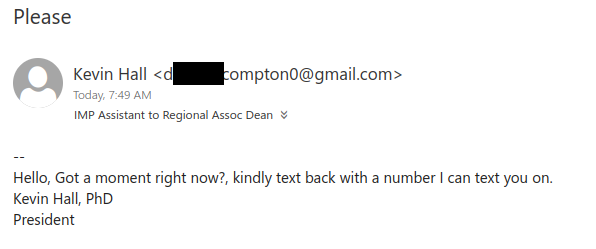Gift card scammers impersonate people in positions of authority to try to make requests look legitimate and prey on people’s desire to be helpful. This example impersonates UVic President Kevin Hall, but other popular impersonation targets include VPs, faculty deans and directors.
Always pay attention to the sender address for emails that claim to be from someone in a position of authority. This one came from a Gmail address, which is a big sign that this email is not really from the president. A real email from the president or any other UVic authority figure would come from their UVic email address (although you still have to be wary in case that was spoofed).
Another bad sign is the fact that the scammer asks to continue the conversation via text messages and wants your phone number for that reason. Requesting your contact information in order to move the conversation to a different method is a common trick that scammers use to avoid detection. Finally, the errors in punctuation and capitalization and the overall vagueness of the message are also signs that this request is not legitimate.
If you replied with your cell phone number, ignore any text messages that come from the scammer and reach out to the Computer Help Desk or your department’s IT support contact for assistance. You will also need to be on the lookout for future phishing and scam attempts via phone or text message because your phone number is now in the hands of a scammer.

From: Kevin Hall <d******compton0@gmail.com>
Subject: Please—
Hello, Got a moment right now?, kindly text back with a number I can text you on.
Kevin Hall, PhD
President
